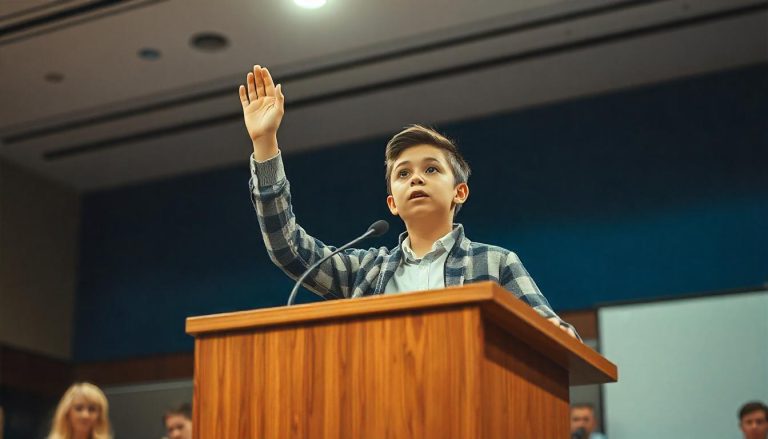6 Best Debate Topics for Secondary Schools in Nigeria
Table of Contents
Debates are more than just classroom activities in Nigerian secondary schools. They serve as a platform where students can express their ideas, sharpen their critical thinking, and engage in constructive discussions. Debating helps young minds stay informed on national and global issues while enhancing public speaking and reasoning skills. The debate topics for secondary schools in Nigeria offer diverse subjects, ranging from education and politics to social issues and culture, helping students explore various viewpoints. By selecting the right debate topics for secondary schools in Nigeria, educators can provide an engaging and thought-provoking experience for students.
As schools in Nigeria strive to equip students with the skills necessary for future leadership roles, debates provide an essential outlet for honing communication, problem-solving, and decision-making abilities. In this article, we will explore debate topics for secondary schools in Nigeria, highlighting important issues that are relevant to the Nigerian society and the world at large.

1. Educational Debate Topics for Secondary Schools in Nigeria
1.1 The Role of Technology in Modern Education
In recent years, the role of technology in education has grown significantly. This topic is important for students in secondary schools in Nigeria to debate, as it helps them understand the balance between digital tools and traditional learning. Should schools in Nigeria adopt more technology-driven learning methods, or is there a risk that students may become overly reliant on gadgets? The debate around technology’s role in education not only affects the Nigerian classroom but also speaks to the broader global conversation about digital literacy and the future of education.
Students can explore the pros and cons of online learning, digital textbooks, and other educational technologies that are transforming schools globally. The argument can include issues such as the digital divide, where some students may not have access to the necessary devices or internet services, creating inequality in the learning experience.
1.2 Should Schools Emphasize Practical Skills Over Theoretical Knowledge?
Another important debate topic for secondary schools in Nigeria is whether schools should prioritize practical skills over theoretical knowledge. While traditional subjects like mathematics, English, and science form the backbone of the education system, many argue that practical skills such as entrepreneurship, computer programming, and vocational training are equally important in preparing students for the workforce.
By focusing on this debate, students can analyze the current curriculum and debate whether it meets the demands of the modern job market. Should Nigerian schools introduce more technical and vocational subjects to complement the academic curriculum, or would this undermine the value of a well-rounded education?
1.3 The Impact of Free Education on National Development
Is free education a viable solution to Nigeria’s educational challenges? This debate topic tackles the issue of whether making education at all levels free would significantly improve national development. Proponents argue that access to free education would increase literacy rates, boost the economy, and create more opportunities for future generations. On the other hand, critics may question whether Nigeria’s government has the resources to sustain a nationwide free education policy.
Debating this topic encourages students to think critically about Nigeria’s education funding, the role of private institutions, and the potential long-term benefits or consequences of free education on the country’s development.
1.4 Should Sex Education Be Made Compulsory in Schools?
With increasing discussions on reproductive health, many Nigerian secondary school students might find the topic of sex education quite relevant. Should sex education be part of the compulsory curriculum in secondary schools? This debate topic touches on issues of public health, morality, and societal attitudes toward sex. Proponents argue that it would reduce the rates of teenage pregnancy and sexually transmitted infections, while opponents may worry that it goes against traditional or religious values.
This topic helps students critically examine the role of schools in addressing sensitive issues that affect their age group and how such education might benefit or challenge their understanding of relationships and personal responsibility.
2. Social Issues Debate Topics for Secondary Schools in Nigeria
2.1 The Effectiveness of Social Media in Shaping Youth Opinion
The role of social media in shaping the opinions of Nigerian youth is an essential debate topic for secondary schools. In an era where platforms like Twitter, Instagram, and TikTok dominate the lives of young people, students can debate whether social media is empowering Nigerian youth to engage in political, social, and cultural discussions or if it is simply reinforcing stereotypes and spreading misinformation.
Debating this topic enables students to understand the power of digital media in shaping public opinion and its role in modern activism, while also considering the potential dangers, such as online bullying, misinformation, and the loss of face-to-face communication skills.
2.2 Should Nigeria Embrace Same-Sex Marriage?
As discussions around LGBTQ+ rights gain momentum across the world, Nigerian students may find it engaging to debate whether Nigeria should embrace same-sex marriage. This debate topic brings to light the country’s legal, cultural, and religious perspectives on the matter. Students can explore the human rights angle, where people advocate for equality and fairness, and the cultural perspective, which may conflict with traditional Nigerian values.
The discussion provides students with an opportunity to analyze Nigeria’s laws and global human rights issues, encouraging open-mindedness while respecting diverse opinions.
2.3 Is the Youth Unemployment Rate a National Emergency?
Youth unemployment remains a significant challenge in Nigeria, making this a crucial debate topic for secondary schools. Should Nigeria treat the high unemployment rate among its youth as a national emergency? Students can discuss the causes of youth unemployment, such as lack of job opportunities, insufficient skills training, and economic policies, and consider solutions like entrepreneurship programs, skill development initiatives, and government job creation efforts.
This topic helps students evaluate the broader implications of unemployment on Nigeria’s economy and social stability, fostering critical thinking and solution-oriented discussions.
2.4 The Role of Parents in Shaping Teenagers’ Behavior
This topic delves into the influence of parents on the behavior and attitudes of teenagers. In the context of Nigeria, where family and community values play a significant role, should parents be more involved in shaping their children’s character and decision-making, or should teenagers have more independence to develop their own ideas?
Debating this topic allows students to reflect on family dynamics, the role of schools in character education, and how societal expectations influence adolescent behavior.
3. Political Debate Topics for Secondary Schools in Nigeria
3.1 Should Nigeria Adopt a Presidential System of Governance?
Nigeria’s political system has been the subject of much debate, particularly regarding whether the country’s presidential system is the best approach for effective governance. Students can debate whether Nigeria should retain the presidential system or switch to a parliamentary system, comparing the advantages and disadvantages of both.
This topic will encourage students to critically assess the effectiveness of Nigeria’s political structure and consider reforms that may better serve the needs of the Nigerian populace.
3.2 The Effect of Corruption on Nigeria’s Economic Growth
Corruption is widely regarded as one of Nigeria’s most significant challenges. This debate topic will ask students to explore how corruption affects Nigeria’s economic growth and what steps can be taken to reduce corruption at various levels of government.
Students will learn about the links between corruption, misallocation of resources, and the country’s development challenges, engaging with both local and international examples of anti-corruption measures.
3.3 Should Nigeria Have a Nationwide Local Government Reform?
The structure of local governments in Nigeria has long been a topic of political discourse. This debate allows students to discuss whether Nigeria should implement a nationwide reform to improve local governance, reduce corruption, and increase accountability. By exploring this topic, students will learn about decentralization and the importance of effective local governance in strengthening democracy.
4. Environmental Debate Topics for Secondary Schools in Nigeria
4.1 Is Climate Change a Real Threat to Nigeria’s Future?
As climate change continues to pose a global threat, students in Nigeria can debate its relevance to the country’s future. Should Nigeria take immediate steps to address climate change, or is it an issue that primarily affects other nations? Students can explore the environmental, social, and economic impacts of climate change, focusing on how Nigeria’s agricultural sector and vulnerable communities may be affected.
4.2 Should Nigeria Ban Plastic Bags to Protect the Environment?
Plastic pollution is a growing problem in Nigeria, and this debate topic encourages students to explore whether the government should impose a nationwide ban on plastic bags. Students can discuss the environmental impact of plastic waste, the benefits of sustainable alternatives, and the challenges of enforcing such a ban in a country with limited waste management infrastructure.
5. Technology and Innovation Debate Topics for Secondary Schools in Nigeria
5.1 Will Artificial Intelligence Replace Human Workers in the Future?
The rise of artificial intelligence (AI) brings both opportunities and challenges. Students can debate whether AI will eventually replace human workers, especially in industries like manufacturing, customer service, and even healthcare.
This topic opens a discussion on automation, job creation, and the need for new skill sets in Nigeria’s workforce. Students will be able to analyze the potential benefits and challenges AI brings to Nigerian society.
5.2 Should Nigeria Invest More in Renewable Energy Sources?
With the world moving toward sustainable energy solutions, this debate topic focuses on whether Nigeria should invest more heavily in renewable energy sources such as solar, wind, and hydropower. Students will evaluate the environmental and economic benefits of shifting to green energy and consider the feasibility of such a transition in Nigeria.
6. Cultural Debate Topics for Secondary Schools in Nigeria
6.1 The Role of Traditional Festivals in Modern Nigerian Society
Nigerian culture is rich with traditional festivals that celebrate history, religion, and community. Should these festivals continue to be a significant part of modern Nigerian society, or are they outdated in the face of globalization? Students can debate whether these festivals should be preserved or reformed to align with modern values and lifestyle.
6.2 Should Nigeria Protect Its Indigenous Languages?
With over 500 languages spoken in Nigeria, this topic considers whether the government should take more steps to protect and promote indigenous languages. Debaters can discuss the cultural importance of these languages and the role they play in preserving Nigeria’s diverse heritage. Should schools teach indigenous languages, and what impact would that have on Nigerian identity?
Conclusion: Summary and Final Thoughts
Debating is an essential tool for secondary schools in Nigeria. It enhances students’ critical thinking, boosts their confidence, and helps them stay informed about pressing issues affecting their society. Debate topics for secondary schools in Nigeria cover a wide range of issues, from education and politics to environmental challenges and cultural identity, all of which offer valuable learning opportunities.
By exploring these topics, students not only develop valuable skills that will serve them throughout their lives but also engage in meaningful discussions that can shape their views on the world. Through debate, students can become the future leaders, activists, and thinkers who will drive Nigeria’s development in the years to come.
FAQs
What makes a good debate topic for secondary school students in Nigeria?
A good debate topic for secondary schools should be relevant, thought-provoking, and challenging. It should encourage students to think critically and present arguments from multiple perspectives.
Why are debates important for secondary school students in Nigeria?
Debates help students improve their public speaking, critical thinking, and communication skills. They also encourage students to engage with current issues affecting their society.
How can debating help students in real life?
Debating develops important life skills, such as logical reasoning, teamwork, and effective communication, which are beneficial in both personal and professional settings.
Are there any online resources for debating in Nigeria?
Yes, platforms like the Nigerian Debate Association and various educational websites offer resources for students to learn about debate formats, improve their skills, and participate in competitions.






